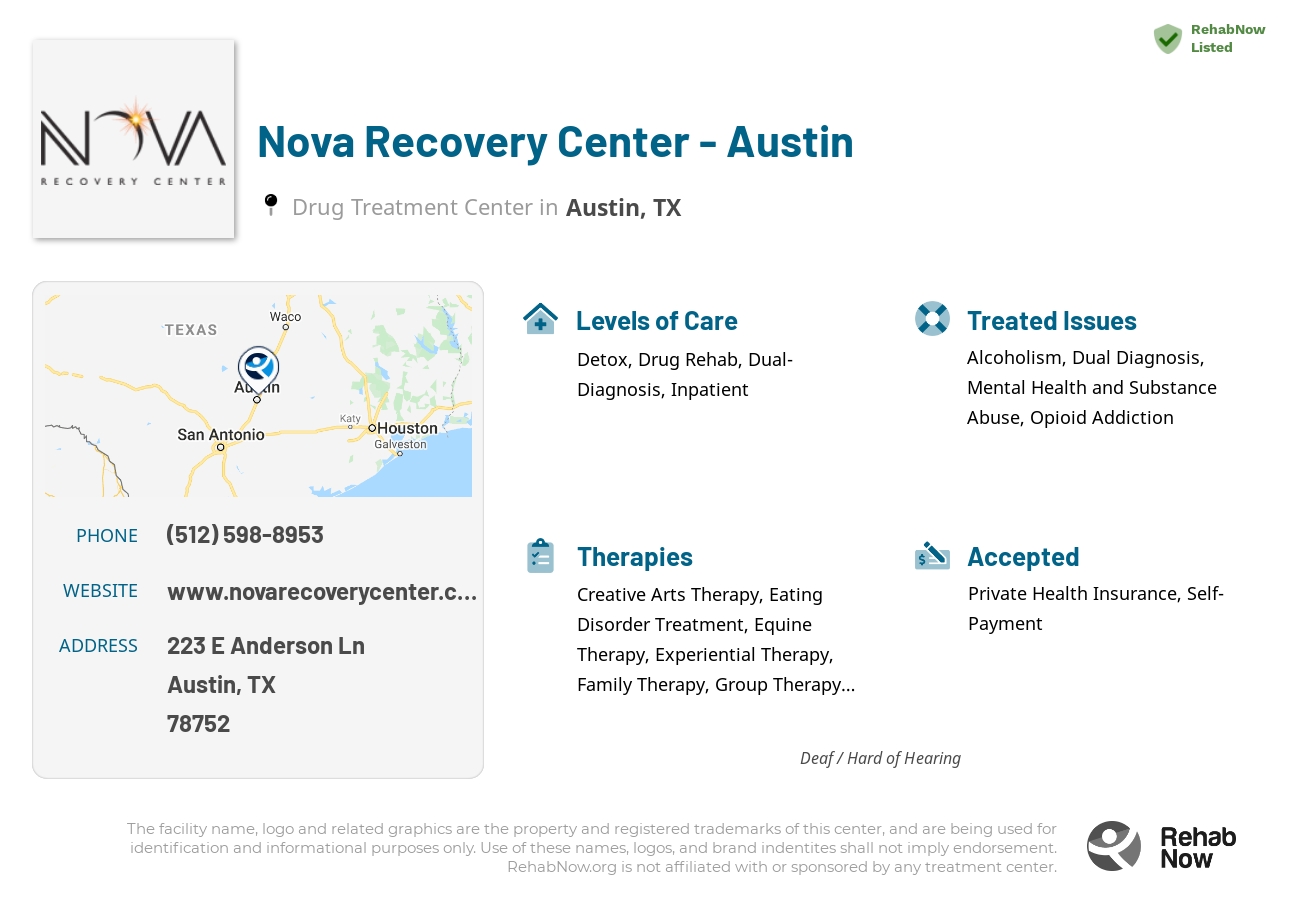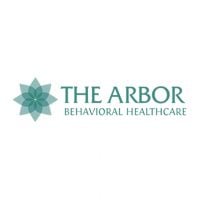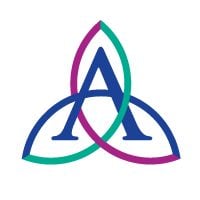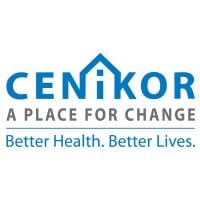About Nova Recovery Center - Austin in Texas
Nova Recovery Center in Austin provides specialized treatment for a variety of addiction and mental health issues, including alcoholism, dual diagnosis, opioid addiction and eating disorders. Treatment is individualized to the needs of clients and their specific issues. Treatment approaches include detox, drug rehab, dual-diagnosis, inpatient and outpatient interventions as well as creative arts therapy, equine therapy, experiential therapy, family therapy, group therapy, individual therapy, life skills, nutrition therapy and trauma therapy. They are also well-versed in providing cognitive behavioral therapy (CBT). Additionally, this center accepts private health insurance.
Nova Recovery Center is dedicated to treating each individual as a whole, and rehabilitating through an integrative approach that focuses on healing both the clients emotional and physical aspects. Clients work with a highly qualified team of doctors, nurses, and counselors with the aim of helping them become independent, productive and whole individuals. Their primary focus is on helping the patient understand their addiction and the underlying issues, so that they can move forward in life in a positive, healthy way.
Genders
Ages
Modality
Additional
Conditions and Issues Treated
Treatment for opioid addiction is best made with the help of medical professionals who are experienced in dealing with these types of drugs. This treatment can involve medications, exercise, behavioral therapy, and counseling sessions. It is important to note that the effectiveness of treatments for opioid addiction vary, so it is vital to research which treatment options are suitable for each individual.
Many people who struggle with opioid addiction need to attend specific programs like methadone , Suboxone or Vivitrol clinics.
These types of programs will provide the patient with legal, prescription medications that can help them overcome their cravings for illegal opioids like heroin or fentanyl . If the patient has a chronic condition like Hepatitis C, they must undergo treatment before they can begin taking these medications.
Individuals who are addicted to drugs and/or alcohol often have one or more co-occurring mental health disorders. Addressing both the addiction and the mental health problems at facilities like Nova Recovery Center - Austin can be very beneficial for these individuals.
Common mental health conditions that often co-occur with addiction include:
- Anxiety Disorders – People with drug and alcohol problems often suffer from anxiety disorders such as panic disorder, obsessive-compulsive disorder, social anxiety disorder, and generalized anxiety disorder.
- Depression – One of the most common mental illnesses co-occurring with addiction is major depressive disorder.
- Attention-deficit hyperactivity disorder (ADHD) – Many people with drug and alcohol problems also suffer from ADHD.
- Bipolar Disorder – People with bipolar disorder are more likely to suffer from drug and alcohol problems than the general population, and vice versa.
Levels of Care Offered
This center offers a variety of custom treatment tailored to individual recovery. Currently available are Detox, Drug Rehab, Dual-Diagnosis, Inpatient, with additional therapies available as listed below.
Detox is the stage of recovery where the drugs or alcohol are entirely removed from your body. There are two different ways to detox, with medications and without. For many drugs and alcohol, the acute phase of detox can be completed in a number of days.
Inpatient recovery offers individual therapy, groups, and family therapy. The length of inpatient addiction treatment depends on the addict and their addiction. Inpatient rehab is a costly drug treatment, costing anywhere from $30k- to $60k. However, insurance often offers help in covering these costs.
Therapies & Programs
Individual therapy is ideal for addicts who want to focus on themselves. It can also be helpful for those whose withdrawal symptoms are exacerbated by the presence of other people.
Benefits of individual therapy are:
- Access to a personalized treatment plan that focuses on the individual needs of the addict
- More privacy during treatment sessions
- Better personal development through introspection
- Increased self-awareness regarding addictive tendencies in order to avoid relapse
- Greater potential for a long-term recovery plan
- Receiving professional advice and detox assistance from medical staff
Family therapy can help you and your family deal with old issues that may trigger substance abuse. The idea behind family therapy for drug addiction is that you are never fully healed from substance abuse until you’ve healed your relationship with your family, too. To get sober, you need to find a different way to cope with the pain in your life.
This is when a group of people in various stages of recovery meet up and discuss their experiences, triggers, successes, failures, and even alternative therapies! Unlike support groups where everyone already knows each other, group therapy is conducted along side outpatient or inpatient treatment at Nova Recovery Center - Austin.
Trauma therapy is a clinical process that helps individuals deal with mental stress often caused by traumatic events. The therapist helps the person identify, understand and work through the problem. This is done with the help of talking about it in group or one-on-one counseling sessions.
Therapists use relaxation, role-playing, art, and music to help the person open up about what is bothering them. Some examples include:
- Talking about the traumatic event and how it affected them.
- Helping those who have PTSD to deal with their nightmares and recurring memories.
- Working with individuals to resolve the issues triggering the stress, whether seeing someone who reminds them of what happened or feeling helpless.
The individual is also encouraged to help others that are struggling with similar problems. This often helps them feel empowered and gives them hope.
Trauma therapy is not for everyone; it is usually reserved for people who have recently experienced a traumatic event and struggle to get over it. It is generally done for children, teenage victims of sexual assault, and war veterans.
CBT is a psychotherapy approach and method. [ws-nap-name] people to examine how their thoughts, including habitual harmful and inaccurate thinking, affect their actions. CBT is based on the idea that rigid, inflexible thinking leads to poor stress management, which leads to emotional distress.
Similarly, CBT helps people identify and change negative behaviors. It makes you question your perceptions and ask if they are realistic. CBT asks people to examine their behaviors and emotional responses and how they affect their lives. CBT aims to change people’s thinking and behavior to lead a more balanced and healthy life.
Moreover, CBT has been shown to reduce anxiety disorders, depression, and symptoms associated with harmful thoughts or actions.
Those struggling with addiction can benefit from learning certain life skills. It is not as simple as quitting drinking or taking drugs and thinking that the hard part is over. Being sober means living a whole new way of life. Many recovering addicts have found that they need to develop talents like time management, organization, communication skills, socialization skills, and self-esteem to make their life in sobriety work, Nova Recovery Center - Austin is here to help with that.
Nutrition therapy has been used to help drug addicts for decades. Many early reports on addiction treatment indicate that some patients recovered from the “satisfying power of food”. For years, this phenomenon has been utilized as a treatment modality in eating disorders for adults, adolescents, and children. Specific nutrients have been identified that influence neurotransmitters associated with reward pathways of the brain.
Studies have shown that carbohydrate loading with complex carbohydrates to elevate serotonin levels was effective in treating bulimia nervosa. This approach prompted researchers to explore the use of this type of nutritional intervention in other disorders.
Nicotine replacement therapy is a drug treatment that allows people to get the effects of nicotine without chewing or smoking. The therapy is often done with a patch, and doses of nicotine are reduced until nicotine is no longer needed. NRT helps smokers get nicotine into their system without resorting to smoking, and it has been shown to be an effective way to help people quit smoking. Coupling NRT with counseling and other means of support gives long-term smokers a better chance of removing their unhealthy habit.
Patient Experience
Creative Arts
Creative Arts Therapy is one of the most effective types of therapy used in addiction recovery at Nova Recovery Center - Austin. The use of art, music, dance, and other creative pursuits stimulate neurogenesis (the growth of new brain cells) which helps increase memory, focus, problem-solving abilities, and self-awareness. It also increases motivation to make changes in one’s life and reduces stress and anxiety, allowing addicts to combat triggers more effectively.
Creative Arts Therapy helps drug users increase their self-awareness. A major factor in addiction is avoidance of emotions, which can be challenging to identify or express. Creative arts therapy helps raise awareness of feelings. It also allows addicts to explore themselves and their relationships with others more deeply, which can help them break the patterns of addictive behavior that have developed.
Experiential Therapy at Nova Recovery Center - Austin
Experiential Therapy is a type of therapy that involves activity to recreate situations that may have caused trauma or negative emotions. Experiential therapy at Nova Recovery Center - Austin in Austin, TX can involve acting, props, arts and crafts, animal care or other tools that may be effective. This therapy is done on an individual basis and can help revisit and heal from past traumas. Trust between the therapist and individual is important for success. Experiential therapy can help you more closely become you and move through life positively and authentically.
Equine Therapy in Texas
EAT is a type of treatment that matches someone in need of therapy with the responsibilities of caring for horses. EAT is a form of therapy that combines horseback riding or daily interactions with horses that have emotional issues. This therapy helps overcome conflicts in relationships, self-confidence, addiction, and much more. Drug addicts can find alternative ways to handle stress because they can relate with the animals during equine therapy.
Payment Options Accepted
For specific insurance or payment methods please contact us.
Is your insurance accepted?
Ask an expert, call (888) 674-0062
Nova Recovery Associated Centers
Discover treatment facilities under the same provider.
Learn More About Nova Recovery Centers
Additional Details
Specifics, location, and helpful extra information.
Austin, Texas 78752 Phone Number(512) 598-8953 Meta DetailsUpdated November 25, 2023
Staff Verified
Nova Recovery Center - Austin Patient Reviews
There are no reviews yet. Be the first one to write one.
Austin, Texas Addiction Information
Texas is one of the primary hubs for drug smuggling into the country. The border between Texas and Mexico is more than 1,000 miles long. More than 10 million residents use alcohol every year and more than 25% of those are minors. Alcohol and drug use has become so common in Texas that almost 15% of all deaths can be attributed to these substances.
Austin, Texas, has a drug addiction problem that is sadly serious. According to recent statistics, half of the state's overdose deaths occurred in the city of Austin. This means that, on average, there are about 2.5 drug overdose deaths in Austin each day. There are also many sober support groups in Austin to help you stay on track and focus on your recovery goals.
Treatment in Nearby Cities
- Georgetown, TX (20.1 mi.)
- Bonham, TX (240.9 mi.)
- Frisco, TX (201.0 mi.)
- Beeville, TX (134.4 mi.)
- Minot, TX (1,251.8 mi.)
Centers near Nova Recovery Center - Austin
The facility name, logo and brand are the property and registered trademarks of Nova Recovery Center - Austin, and are being used for identification and informational purposes only. Use of these names, logos and brands shall not imply endorsement. RehabNow.org is not affiliated with or sponsored by Nova Recovery Center - Austin.











